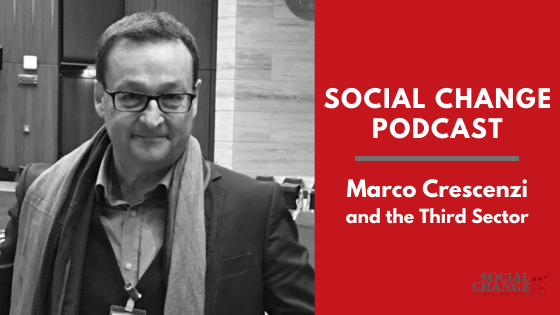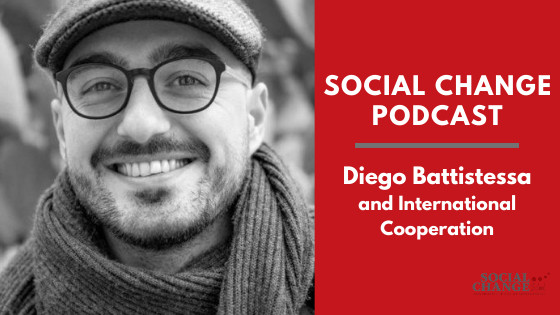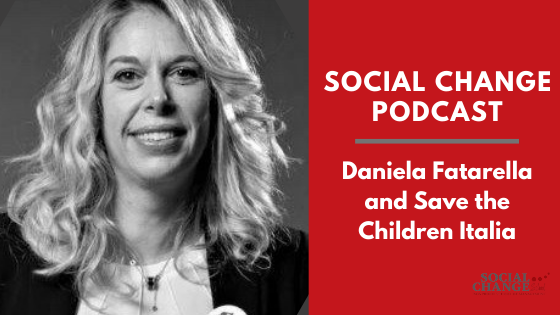Andrea: Good Morning and welcome to the new episode of the Social Change Podcast made by the Social Change School in cooperation with Eduway Social Business.
We are ready to welcome to our podcast Alessandra Prampolini, General Director of WWF Italia!
Alessandra Prampolini: Good Morning, thank you for inviting me.
Andrea: The management team of WWF Italia is completely composed of women, because you are the General Director and the President is Donatella Bianchi. We already talked with Daniela Fatarella, CEO of Save the Children Italia, so we are really curious to know your point of view on how it is to be a woman manager in this sector?
Alessandra Prampolini: It is an interesting challenge and a great opportunity, since there is no doubt that we come from the human history of man as managers and so we see leadership with specific characteristics that in our society are connected to men in general, to the ability to win other people other than convince them, but culturally and historically the feminin grows where the principal task is to mediate and put together. It is clear that to have a mixed leadership that combines these two styles, more than in other sectors in the third one, is extremely interesting. The third sector is particularly prone to this kind of change and evolution, because already some classical rules around leadership cannot be applied 100%. The for profit sector is usually composed of those giving orders and those executing them, the non profit was born from a motivational input, that is different and personal to everyone, as a big passion, it starts from a different grond. It is a world made of people that act motivated by a vision and shared values, and clearly all the dynamics that are in it, since the relationship management in the team and all the stakeholders its really different. I truly believe there is going to be space for an evolution in the third sector that is going to show what it means to be a manager also to the for profit world.
Andrea: We all heard of WWF, many collected your figurines and sticked on our notebooks your logo. But what does the WWF do in practice?
Alessandra Prampolini: I am part of the generation that grew up with the figurines and the notebooks and the amazing books, like you, this material has nurtured my already developed passion for the topics that are relevant for the organization like nature.
WFF internationally was born 60 years ago, but in Italy only 55. The organization evolved together with the conditions of our nature and of the planet. WWF was born as we all know to defend some species and some iconic natural habitats, like the fight for Panda tigers, polar bears, or for the amazonian forest.
With the years passing also the organization evolved, next to the protection of nature and of natural habitats other issues became more urgent and dramatic, because somehow also us as human beings evolved and we kept operating a transformation on the planet that requires not only a conservation but also a restoration of places, habitats that have been damaged where this did not happened in a irreversibile way.
One of the biggest challenges that we as WWF have today is one connected to sustainability, somehow to those that are our lifestyles. I believe that our most important goal is to pursue the conversation dn defense of nature and bring people to see that it is possible to live differently and more compatible with the environment around us.
Andrea: So we are in the middle of a big green wave, the public opinion is everyday more into talking about climate change and green future, what do you think about it, are you positive towards our future and what do you think are the next steps we are going to take then?
Alessandra Prampolini: The green wave has been there for a while and has been growing in the last years and really fast, it manifested with Greta Thunberg, the first global simultaneous manifestation that saw protagonists young people and has been going on for years now, and it is dedicated to the state of health of our planet, and it particularly meaningful, especially when it got together with the pandemic, that made us go behind on some progresses there were been made, like on plastic and its single use. Somehow it also made open the eyes of people on how we as humans are connected to the balances of the planet. We all know that one of the most common causes of pandemics and epidemics is this mix of indiscriminate use of natural resources that ends up destroying habitats that we shouldn’t touch. With our actions we make possible the meeting of human beings with other animal species that shouldn’t get in touch with us, this creates a series of effects that we are now dealing with.
The WWF owns the current sentiment of people in need to identify a different solution to live and choose to look at the future knowing that there is no incompatibility between us and the environment around us. There is no doubt that this shared feeling is made of fear and hope at the same time, because we need to change our course, which was chosen many years ago, that consisted into adapting the environment around us to our lifestyle, and we started some processes in the way we move and get food and how we transport ourselves and how we use the energy we need. This had a really fast acceleration, climate change is
There is another crisis, next to the climate change one, that we are becoming everyday more aware of, and that we have denounced since the beginning, the one of the “loss of biodiversity”, that little by little is reducing, both in numbers and in variety.
I believe somehow a greener future is inevitable because our planet is a living system and will rebalance itself. The only important thing is to find our way as human beings to be part of this balance and not to be cornered or pushed away from it.
Andrea: So moving to the social-political ground, how WWF , leader association in the environmental sector, interacts with the private sector and which are the main relationships with public institutions?
Alessandra Prampolini: in our vision of change there are 3 main pillars to build a platform that could be valid for everyone.
Number one is : citizens , people, our base, the source of our strength that make us go forward. These citizens need to be more aware and informed and involved in our mission. For profit and institutions, pillar number two and number three are also impossible to leave behind, because without their involvement for the implementation of the vision is partial, the involvement of only single citizens would not be enough, because there will be limitations and less impact.
For these reasons we think it is important to work on two different levels at the same time, on one side with companies, motivating them to get committed in doing innovative choices and challenging their business model too, that might put sustainability at the center looking at the future of society. We are looking for those companies willing to support the current processes and want to be protagonists of the change and make proposals and experiment new innovative things, also with some risks. A change of perspective, that moves the idea of success from pure growth to other parameters, because the world is changing and those that will know how to find their space without creating more consumption will make it, because we will have less and less space. More is better only if it involves benefits for everyone, not for few, this prerogative is changing.
At the same time this involvement of citizens and enterprises needs to be mirrored into institutions that are the only actor that can actually change the rules with laws and regulations and its key to change cultural and societal unwritten rules too.
Institutions are the ones that can actually make this topics center of the public discussion, it is key for this reason the role of European Union, that even if it is not perfect, it still helped a lot and influenced the law making process in this field for the states part of the Union and being an example for all the other countries in the world.
Andrea: Since we are already talking about partnerships, let’s explain a bit more the one with the Social Change School, for the “Yes we pay our interns”, that it is about paying the interns doing formative experiences in NGOs. Can you tell us a bit more, and can you also talk about the involvement of youth in your organization?
Alessandra Prampolini: : I am part of the generation that got into international cooperation with a huge confusion between the roles of employees and volunteers in the sector. I personally had professional experiences that were not paid at all. I am really happy that now this is changing, and that the WWf is part of it. It’s important that this confusion is fading away. It is fundamental to remember that for sure the NGOs need a motivational and passionate staff, that might be confused still now with being a volunteer, and for this reason volunteers are a key part of the sector.
But when an organization grows, has ambitious goals, it is responsible for people covering different kinds of positions and with different responsibilities over multiple projects, even just volunteers that work for the same mission, there is the urge to have an organizational structure, not too far from the one usually present in the for-profit sector.
It would be good if this model is a hybrid between the old non-for profit (NFP) one and the current for profit one, getting the best from these two options. For example, I get frequently surprised by the good changes happening in the for profit in internal communication and the quality of the life of the people working in it. These things were always present in the NFP, we are just not used to selling this as they are, because we have always been mission oriented, we have this added value and this human side of the job that should not be lost but kept, in a moment where still some changes are needed. The recognition of the competences needed to be a professional of the sector, recognizing people skills not only their motivation to achieve organizational goals.
I see the youth coming now in the sector with clear ideas and multiple skills already developed, that only need actual experience to become professionals of the sector.
For this reason, we truly believe that paying interns, even if they are going to stay with us for only a small amount of time, is giving the time they invested in the organization and their experience, the right importance. From each internship both us, as organization and them as individuals get support and education if there are clear objectives and an economic return, especially because young people are asking to be involved and recognized, both from institutions and from the social stakeholders involved in the change society needs, a small example of it is the COP26 recently happened. When they enter big NGOs who share values and vision with passion, they still need to be aligned with goals and rules of the sector, so from this point of view it makes sense to recognize their job even more.
Andrea: To close this episode I would love to hear a personal experience that shaped your professional path in the sector, could you please tell us?
Alessandra Prampolini: Looking back to the last 2 years and the role I am currently covering I see a ring shaped path. I choose to study development and international cooperation starting from my passion for nature that influenced my professional choices. My first internship experience was in WWF for example. I matured this awareness in 2001, I was 19, and that year in 2 month 2 really impactful events happened: the first one was G8 happened in Genoa, Italy; the other one is the twin towers terrorist attack. These two main events opened my eyes and convinced me to study cooperation and development, because I realized that without intervening directly on the dynamics influencing the balances at local level it could not be possible for me to imagine another profession or mission to really feel like I was contributing to something useful.
I always lived in a really personal way how we interact with the nature and how we destroy it. The lack of balance it’s not just one and all are connected. For al this reason 2001 has been the year that made me realize that I wanted to become a tool to limit this lack of balance I could see in the world. This choice has been confirmed by different episodes happened recently, like an experience I have done in RDC, a beautiful place where I saw somehow all the difficulties of protecting nature where people have nothing to eat and live in fear of constant war conflicts. There I had the confirmation that it is really important to do everything in our power to preserve these places.
In the last year and a half after the first lockdown, I had the opportunity to travel again in Italy without going abroad, visiting our protected areas, where I found the spirit of the people operating in these places, who ensure everything goes smoothly with huge motivation, balancing the preservation of the nature, with the everyday life and the local economy present in our country, that are Italy’s greatest asset.
I found again motivation for the professional path that I choose that still makes sense for me: the possibility to make people live a qualitative life and preserve and respect nature, that allows us to have a good and beautiful life on the planet.
Do you want to listen to the italian version of the episode? Click here to check it on Spotify!




